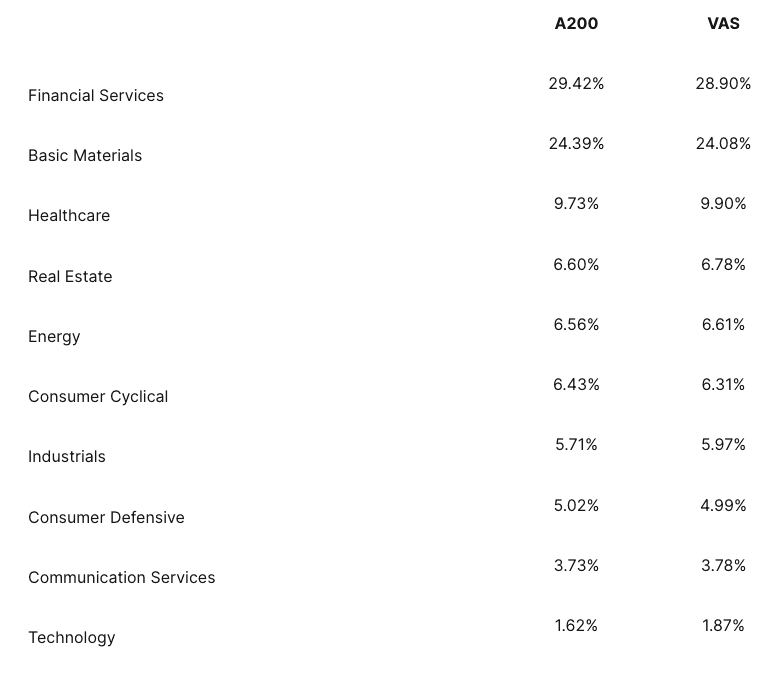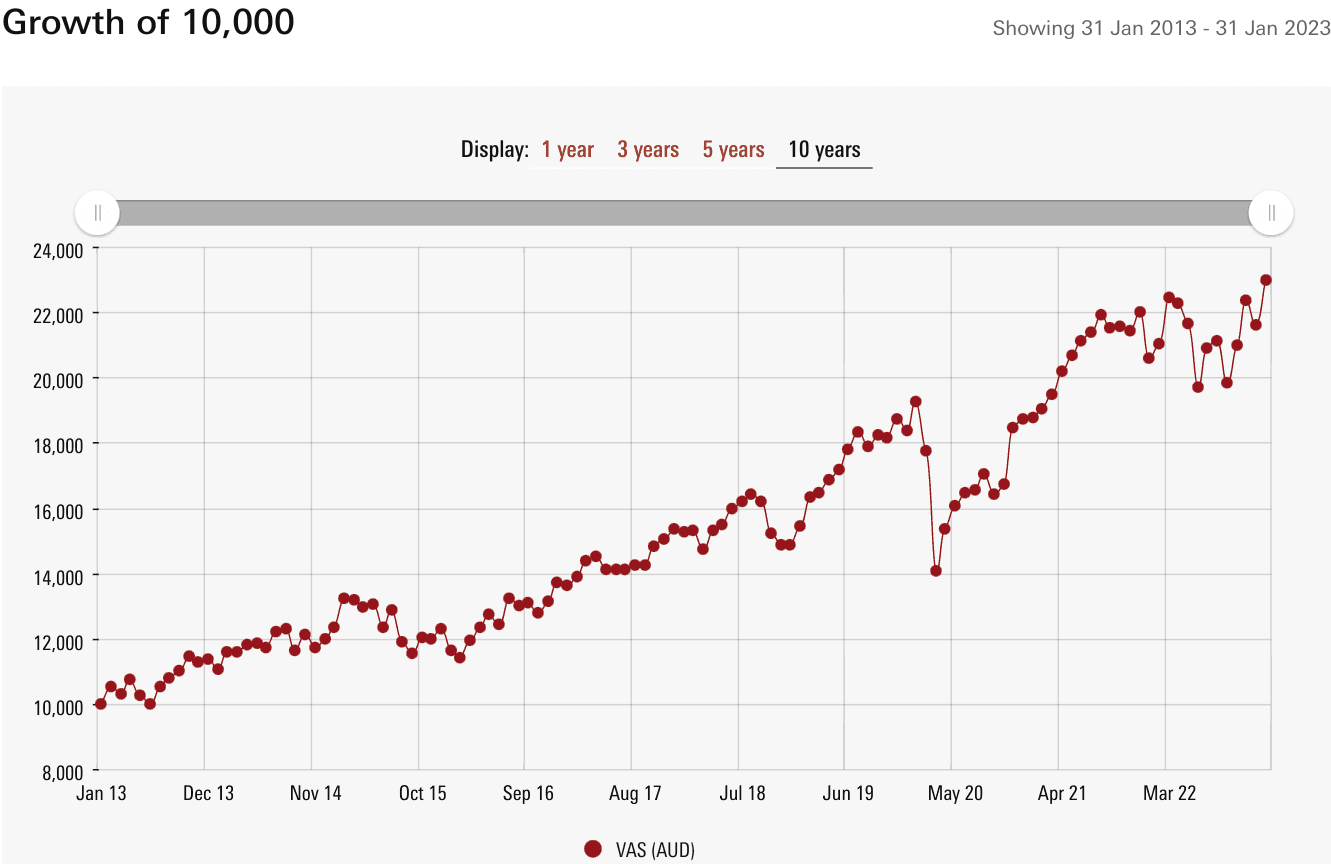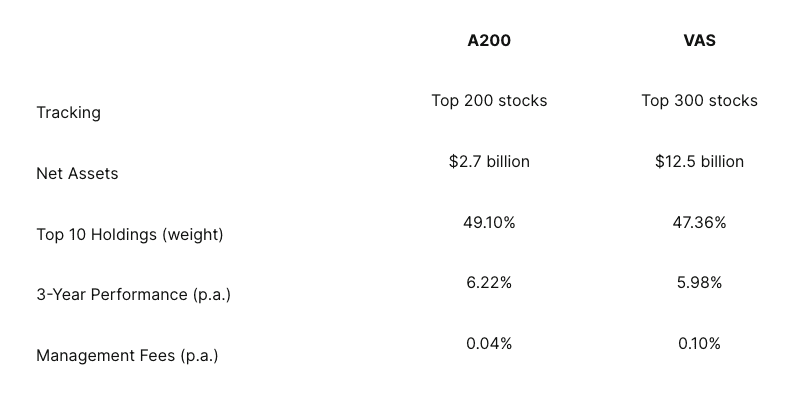ETFs Head-to-Head: Vanguard 'VAS' vs BetaShares 'A200'
Rene Anthony
Key takeaways:
VAS is among the largest ETFs on the ASX, with nearly $12.5 billion in funds under management
A200 is the lowest-cost ETF offering exposure to the ASX, and has outperformed VAS over a three-year timeframe
They are two of the most held ETFs within the Selfwealth community, and also the two most popular pure-play ETFs focusing on the Australian share market.
Both the BetaShares Australia 200 ETF (ASX: A200) and the Vanguard Australian Shares Index ETF (ASX: VAS) focus on major ASX indexes, providing investors with low-cost access to top Australian businesses via a single equity.
How do the two ETFs stack up? We take a look at some of the key facts and figures that distinguish these two high-profile ETFs.
Fund Objective
The A200 ETF aims to track the performance of an index (before fees and expenses) comprising 200 of the largest companies by market capitalisation listed on the ASX.
While A200 tracks the Solactive Australia 200 Index, for all intents and purposes, the ETF effectively tracks the S&P/ASX 200 index, with both indexes relying on a market capitalisation weighting.
By way of comparison, the Vanguard Australian Shares Index ETF seeks to track the return of the S&P/ASX 300 Index before taking into account fees, expenses, and taxes.
The ASX 300 is an index made up of the top 300 companies listed on the local share market, also weighted by market capitalisation.
Fund Profiles and Holdings
Between the pair, VAS is the more established fund. First admitted to the ASX in May 2009, the total size of the fund is now just shy of $12.5 billion. That is almost five times the size of the A200 ETF, which has grown to approximately $2.7 billion in funds under management since being admitted to the ASX in 2018.
Vanguard ETF also has the honour of being the largest ETF on the ASX, and that is without taking into account its even larger asset base owing to the fact the product is also offered as a wholesale fund.
In January 2023, across all ASX market participants or brokers, there were over 31,000 trades in VAS, albeit there was an outflow of $9.8 million in funds for the month. On the other hand, A200 recorded an outflow of $37.9 million, with the ETF the subject of nearly 8,000 trades.
As far as holdings, because each ETF is weighted by market capitalisation, the pair share what is a near identical list for key constituents. VAS offers slightly more exposure to small cap stocks due to tracking the ASX 300, but the top 10 for both, ranked by weighting, is as follows:

Furthermore, sector weightings are very similar across both products:

Performance and Distributions
Since inception, and up until the end of January 2023, the BetaShares A200 ETF has returned 8.69% p.a. That trails the 9.21% p.a. achieved by the Vanguard VAS ETF, with that result delivered across a longer timeline owing to the ETF near 14-year history.
For a more comparable result, looking at the three-year returns of each fund, A200 has returned an average of 6.22% p.a. During the same timeframe, VAS has yielded a total return of 5.98% p.a.
Remember, past performance is not indicative of future performance. Furthermore, year-to-year returns can vary significantly, which is why it pays to look at a multi-year timeline where results are smoothed out. Because A200 was established in May 2018, five-year performance data is not available for the fund until May this year.
Nonetheless, over the last year, the A200 ETF has again come out on top, returning 12.41% after fees, whereas VAS has delivered a return of 11.56% over the same period.
Both funds provide distributions on a quarterly basis, but the amount and timing of distributions will vary from period to period, and there may even be periods where no distributions are made.
A200 performance since inception

VAS performance over 10 years

Fees
Following recent price changes, BetaShares describes A200 as the world lowest cost Australian shares ETF.
Effective from 22 February 2023, the fund manager has decreased the management fee from 0.07% p.a. to 0.04% p.a. This fee is based on the Fund Net Asset Value.
For further information on BetaShares fee change, refer to the Supplementary Product Disclosure Statement dated 21 February, 2023, and the corresponding ASX announcement.
There are, however, other fees that investors should be conscious of. BetaShares advises that recoverable expenses, indirect costs, and transaction costs may apply, albeit these costs are negligible and close enough to nothing that the fund manager estimates they represent 0.00% p.a. of NAV. Nonetheless, these costs are typically deducted from the Fund assets as and when they are incurred.
On the other hand, the management fee for Vanguard VAS ETF is 0.10% p.a. The fund attracts indirect costs of 0.00% p.a. and net transaction costs of 0.01% p.a.
Summary
For the most part, A200 and VAS are largely the same in what they provide exposure to, albeit with a modest difference in performance. This boils down to the fact that VAS tracks a larger base of companies, albeit with a slightly higher management fee of 0.10% p.a. versus 0.04% p.a.
For more information, you can read about the BetaShares A200 ETF here, and the Vanguard VAS ETF here. Before investing in any ETFs, you should consult the respective product Product Disclosure Statement, which will be available on the fund website.

Important disclaimer: SelfWealth Ltd ABN 52 154 324 428 (“Selfwealth”) (AFSL 421789). The information contained on this website is general in nature and does not take into account your personal situation. You should consider whether the information is appropriate to your needs, and where appropriate, seek professional advice from a financial adviser and/or accountant. Taxation, legal and other matters referred to on this website are of a general nature only and should not be relied upon in place of appropriate professional advice. You should obtain the relevant Product Disclosure Statement for any product mentioned and consider its contents before making any decision.




